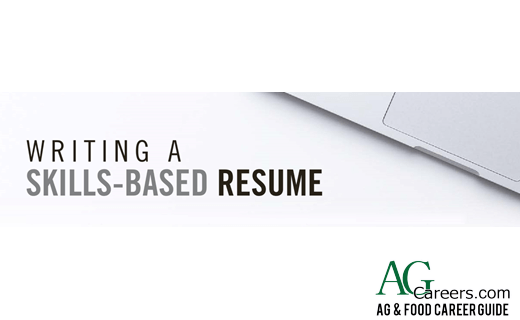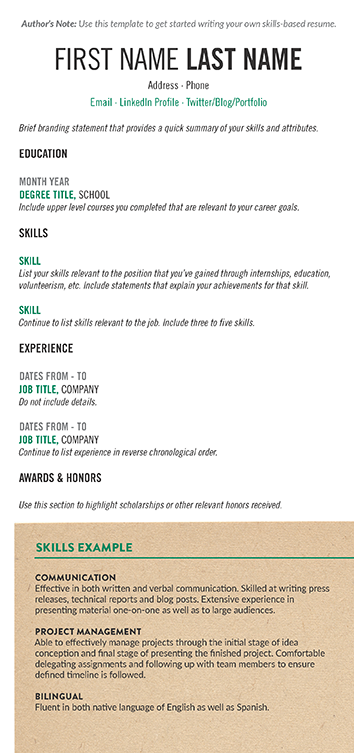- Candidates
- Login
- Set Up Account
- Create a Job Alert
- Search Tools
- Resources
- Employers

Writing a Skills-Based Resume
YOU’RE ABOUT TO sit down and write or update your resume. However, as you scan your work history and education, you feel it does not effectively speak to the kind of employee you are. You know that you have more to share and offer beyond a brief list of internships and bulleted tasks performed. But how can you demonstrate what you are truly capable of to a prospective employer?
What if we told you that you don’t have to adhere to the traditional resume format that is often expected? The skills-based resume is an excellent choice, both for those with plentiful education and experience and for those whose may not fill the page. Learn about what a skills-based resume is, whether it may be right for you, and how to build one.

What Is a Skills-Based Resume?
When most professionals think about resumes, they picture the chronological style. A reverse-chronological resume is the standard resume format which lists and emphasizes your work and education history, with most recent experience first. This format is great, but it’s often not right for everyone. Recent graduates, skilled trade workers, or anyone who has spent substantial time in just one position all likely have abundant experience and skills, despite being able to list only one or two jobs on a resume.
Enter the skills-based resume. This style of resume highlights specific skills gained from your experiences, honing in on their transferability to the current role you’re applying for. This type of resume doesn’t exclude your work history; rather, it simply puts less focus on it, presenting your value as an employee and the skills you could bring to the workplace in a more comprehensive fashion.
Is this format for you?
If any of the following apply, it may be a good fit:
• Your work history consists of numerous short-term roles (internships, work studies, temporary positions, on-campus jobs).
• There are long gaps in your employment (one year or more).
• You are seeking a new role that does not relate to your previous titles.
• You are far removed from your education experience (i.e. internship roles) but have only held one role since and have spent significant time in it (5 or more years).
• Your work history looks redundant on paper as many of your titles and experiences are similar in nature.
• You have no experience to list as you are just starting your career! A skills-based resume isn’t just a good fit for you.
Employers may prefer a skills-based resume (or a combination of the skills-based and chronological resume) as they get a better picture of what you bring to the table as a potential employee. You’ve likely heard that employers spend just seconds scanning any particular resume. A skills-based resume allows for the most important information to jump off the page and catch the reader’s eye.
Think that a skills-based resume is for you? Great! Still not sure how to write one? Not a problem. Here’s an easy guide to assembling a skills-based resume.
As with a traditional resume, crafting an eye-catching header that includes your contact information is necessary. Follow these tips for formatting the next sections of your skills-based resume.
1. BRANDING STATEMENT
A brief branding statement provides a quick summary of your attributes and capabilities. A branding statement is a better use of space than a career objective and allows you to tell the hiring manager more about yourself. To help craft your branding statement think about what you would tell the hiring manager if you only had 15 seconds to sell yourself.
2. SKILLS
Start with a self-assessment of your skills. Do this simply by conducting an internet search for “list of transferable skills.” Print off an example list and mark the skills that you possess and can expand on with your experiences. These can be skills learned from course work, class projects, internships, volunteer experience and even student organizations. You may need to prioritize which skills to include on your resume due to space limitations. A good rule of thumb is to include three to five skills that are pertinent to the position you’re applying for. Analyze the job description, specifically the required and desired skills section, and ensure the skills you include on the resume are relatable to the position.
You may consider including a mix of technical skills (like programming or graphic design) and soft (employability) skills. After each skill, include statements that explain your achievements for that skill. See the box below for example.
Bonus Tip: Practice for the interview by answering the question, “tell me about a time that you utilized your project management (include each skill listed on your resume) skills.”
3. EXPERIENCE
This section will be brief and should include a short work history that only includes the employment dates, job title and employer. You will not provide an explanation along with the role. This section can include paid positions, internships and even volunteer work that is relevant.
4. AWARDS AND HONORS
Though optional, this section can highlight awards, accomplishments or other relevant honors received.
Final Thoughts
Your first attempt at constructing a skills-based resume may seem awkward if you’re used to listing experiences in a chronological format. However, if you’ve determined that a skills-based resume is suitable for your circumstances it will likely come as a relief that there is a more effective way to showcase your qualifications for the position. As with any resume, ask for a second pair of eyes to proofread and even suggest skills that they see in you which you may have overlooked!